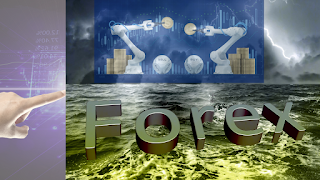forex market trading
What Exactly Is FOREX or the FOREX MARKET? I. PART
The Foreign Exchange market (commonly known as the Forex or FX market) is the world's largest financial market, with over $1.5 trillion changing hands each day.
That is greater than the total size of the US stock and bond markets!
In contrast to other financial markets that have a centralized location (such as a stock exchange), the global currency market does not. It is a worldwide electronic network of financial institutions and banks.
foreign currencies trading
Another distinguishing aspect of the Forex market is that it runs 24 hours a day, according to the opening and closing of financial centers in nations all over the globe, beginning each day in Sydney, followed by Tokyo, London, and New York. Buyers and sellers may be found at any time and in any location, making the Forex market the most liquid in the world.
Historically, only banks and other major financial entities have had access to the Forex market. However, because of technological advancements over the years, the Forex market is now accessible to everyone, from banks to money managers to individual traders trading retail accounts. The opportunity to participate in this fascinating global business has never been better than today. Open an account and become an active participant in the world's greatest market.
Trading currencies on the futures market is considerably different from trading equities or commodities on the Forex Market.
Whether you know it or not, you already have a stake in the Forex market. Simply having money in your pocket qualifies you as a currency investor, particularly in the US Dollar. You have chosen not to hold the currencies of other countries by holding US Dollars. Your purchases of stocks, bonds, or other assets, as well as money put in your bank account, reflect investments that rely substantially on the value of the currency in which they are denominated, the US Dollar.
The value of your assets may vary due to the shifting value of the US dollar and the resulting swings in exchange rates, affecting your overall financial status. With this in mind, it is not unexpected that many investors have taken advantage of exchange rate fluctuations, using the volatility of the Foreign Exchange market to increase their wealth.
Assume you have $1,000 and decided to buy Euros at a cost of 1.50 Euros to the dollar. Then you'd have 1500 Euros. If the value of the Euro versus the US dollar rises, you may sell (exchange) your Euros for dollars and end up with more dollars than you started with.
Example:
You may notice the following:
The previous EUR/USD exchange of 1.5000 indicates
One Euro is equivalent to $1.50 USD.
The first currency (in this case, the EURO) is known as the base currency, while the second (/USD) is known as the counter or quote currency.
The FOREX market is critical to the global economy, and there will always be a high demand for currency exchange. As technology and communication advance, so does international trade. There will be a FOREX market as long as there is international trade. The foreign exchange market must exist in order for a country like Germany to sell goods in the United States and get Euros in exchange for US dollars.
WARNING: RISK:
Currency trading risks
Margined currency trading is an exceedingly hazardous kind of investment that is only appropriate for persons and institutions who can handle the possible losses. A broker account allows you to trade foreign currencies on a highly leveraged basis (up to about 400 times your account equity). If the position(s) held in the account see even a one percent movement in value, the funds in the account that is trading at maximum leverage may be fully lost. Given the danger of losing one's whole investment, foreign exchange trading should only be done with risk capital funds that, if lost, will not have a substantial impact on the investor's financial well-being.


